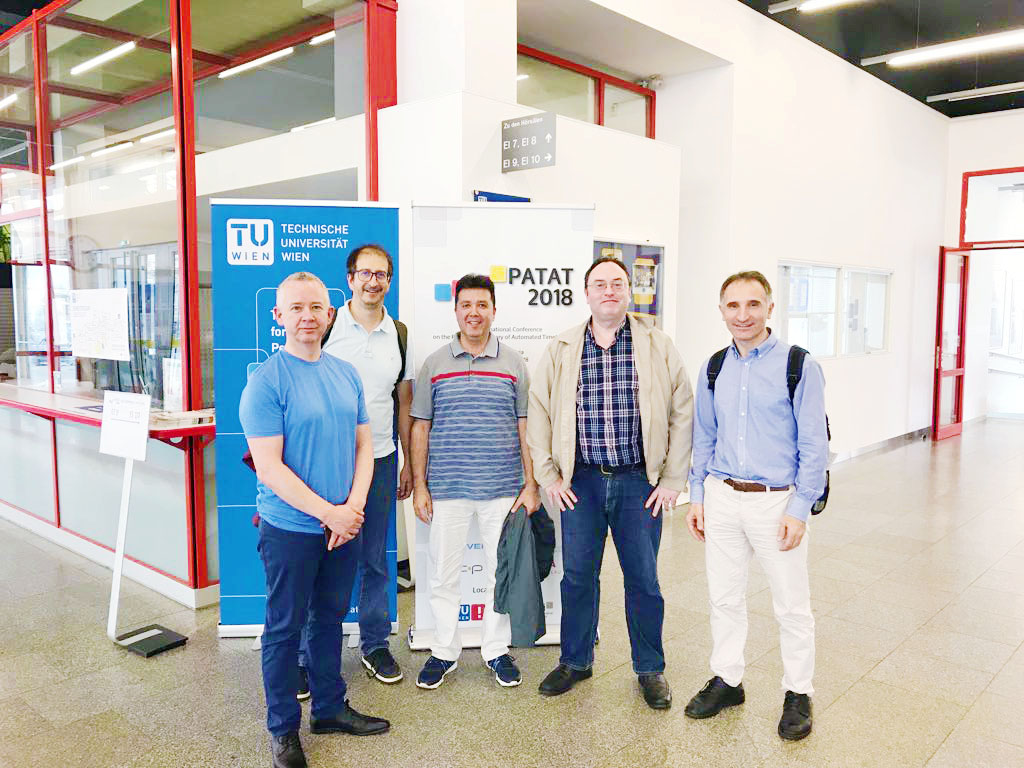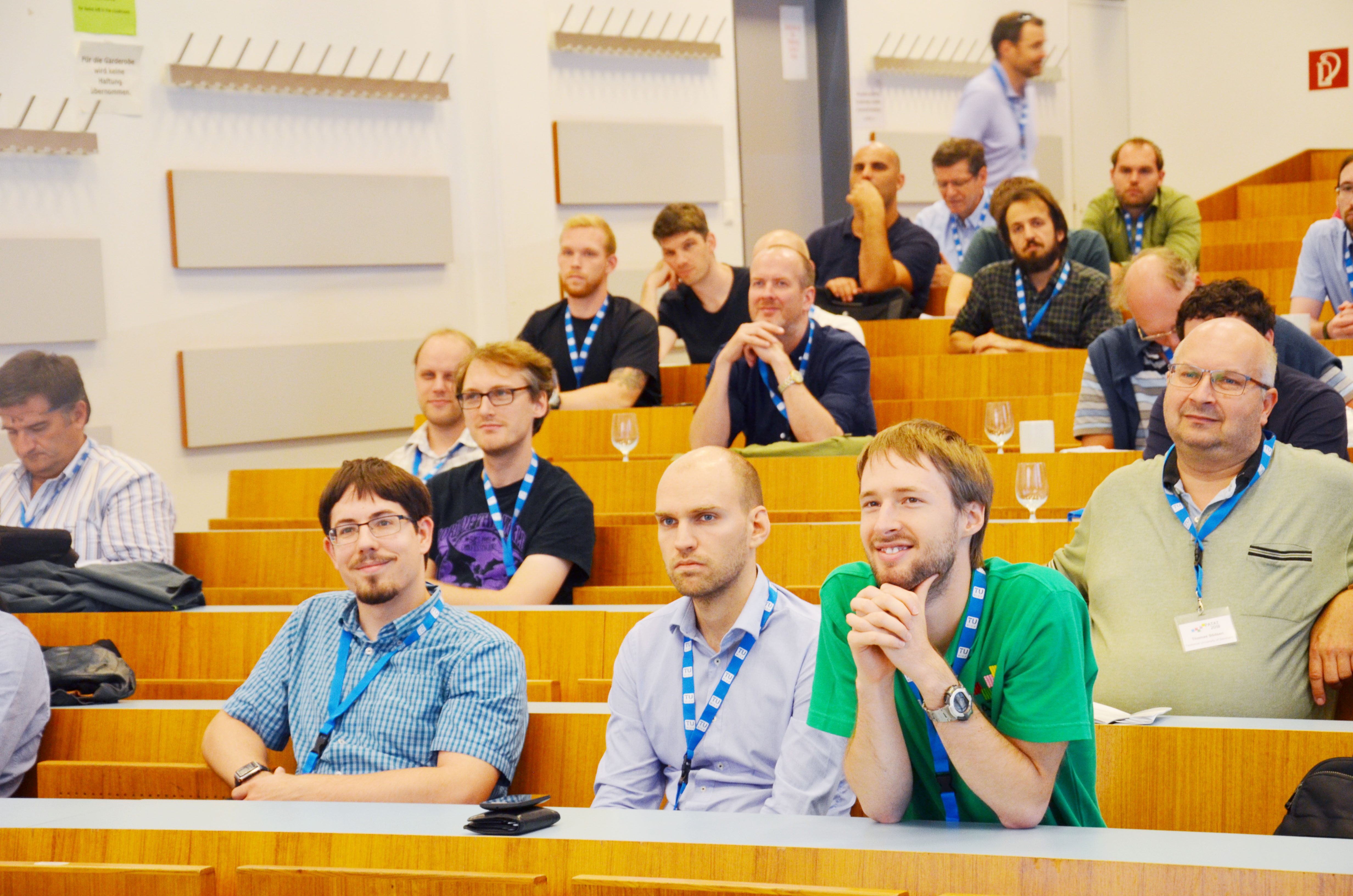PATAT 2018 – Automated timetabling and scheduling
This has been the 12th International Conference on the Practice and Theory of Automated Timetabling (PATAT 2018) at TU Wien, hosted by the Database and Artificial Intelligence Group at the Institute for Logic and Computation. Whether it is sporting events, educational institutions, transportation or employee management– the construction of efficient and automated timetables which optimizes all aspects of material and human resource usage is still challenging. PATAT 2018 has between 28–31 August 2018, seek to align the needs of practitioners and the objectives of researchers.
PATAT2018 Venue
TU Wien, Gusshausstraße 27-29, Ground Floor
PATAT2018 Photo Gallery

PATAT 2018 Chairs: Barry McCollum (Queen’s University Belfast), Luca Di Gaspero (University of Udine), Ender Ozcan (University of Nottingham), Edmund Burke (Queen Mary University of London), Nysret Musliu (TU Wien)
Tuesday, 28.8.2018 (not Flickr, but wakalek collection of twits) here
Wednesday, 29.8.2018 (Flickr), CC BY 4.0 PATAT 2018 here
Thursday, 30.8.2018 (Flickr), CCO, here
Friday, 31.8.2018 (Flickr), CCO, here
PATAT2018 Invited Speakers
With the support of Vienna Center for Logic and Algorithms, PATAT 2018 featured internationally renowned keynote speakers, in the field of timetabling, optimization algorithms, artificial intelligence, and operations research. The invited talks demonstrated extraordinary capabilities in tackling the problems of automated timetabling and scheduling on myriad of real-world problems.
- Johannes Gärtner, Ximes GmbH, AT
- Louis-Martin Rousseau, École Polytechnique de Montréal and HANALOG, CA
- Hana Rudová, Masaryk University, CZ
- Pascal Van Hentenryck, University of Michigan, USA
Keynote: August 29th, at 9:15 at EI9
There are many challenges in timetabling and scheduling which still remained unsolved. One of those is Multi-Activity Shift Scheduling, which encompasses designing shift scheduling where one not only needs to schedule when employees are working or resting, but more precisely, what activity they are performing. This issue was addressed by the first keynote talk by Louis-Martin Rousseau, from École Polytechnique de Montréal, and Canada Research Chair in Healthcare Analytics and Logistics (HANALOG.ca). His research rooted in the field Artificial Intelligence (AI), allowed him to co-develop models and algorithms used by companies such as Planora (acquired by JDA Software), Canadian insurance company Cooperators, or logistic platform FPInnovation.
Keynote: August 30th, at 9:00 at EI9
Among other classical problems which have been studied for many years is the university and high school course timetabling. Another PATAT 2018 invited speaker Hana Rudova has in her talk discussed the organization of the new International Timetabling Competition (ITC 2019) with the aim to motivate further research on complex timetabling problems coming from practice. Professor Rudova from Masaryk University, works on various problems broadly related to educational timetabling, and scheduling of data transport in distributed environments, such as teleoperations. This is just one example of a virtual collaborative environment, where proper timetabling and scheduling enable stabile transfer of data.
Keynote: August 30th, at 14:00 at EI9
The impressive advances in scheduling algorithms, together with the new demands in employee scheduling, was addressed in the talk by Johannes Gärtner, CEO of a company Ximes. The new workforce related scheduling models are those which take into account not only the efficient use of the organizational human resources, but take into consideration also the employee wellbeing, which is heavily influenced by work schedules.
Keynote: August 31st, at 08:30 at EI9
The big data, progress in communication technologies, and connected and automated vehicles demand new solutions provided by advances in timetabling, scheduling, and routing research and algorithm design. Pascal Van Hentenryck in his talk reviewed this opportunity, from its potential societal impact, to the development of new mobility services, and the science and technology powering them. Pascal Van Hentenryck is a professor of Engineering at the University of Michigan. Van Hentenryck’s current research is at the intersection of optimization and data science with applications in energy, transportation, resilience, and computational social science.
PATAT2018 Invited Tutorials
29. August at 14:00 in EI9
Jefferey Kingston´s (University of Sydney) tutorial with the title ,,Specifying Timetabling Problems: An Ongoing Story”, will give a general overview of the specification problem for timetabling.
30. August at 15:00 in EI9
Andrea Schaerf´s (University of Udine) tutorial with the title ,,Simulated Annealing and its application to timetable”, will show the application of Simulated Annealing to some timetabling problems and discuss its results on available benchmarks.
Important Dates
- Early registration: June 25, 2018
- Conference: August 28, 2018 – August 31, 2018
Program Chairs
- Edmund Burke, Queen Mary University of London
- Luca Di Gaspero, University of Udine
- Barry McCollum, Queen’s University Belfast
- Nysret Musliu, TU Wien
- Ender Ozcan, University of Nottingham
Program Committee
The information is available here.
PATAT2018 Local Organizing Committee
- Juliane Auerböck
- Emir Demirović
- Luca Di Gaspero
- Lucas Kletzander
- Florian Mischek
- Nysret Musliu
- Tommaso Urli
- Felix Winter
PATAT2018 Programe
The full program is available on the official website of PATAT 2018 here.
PATAT2018 on Social Media
Facebook: @patat2018
Twitter: #patat2018

